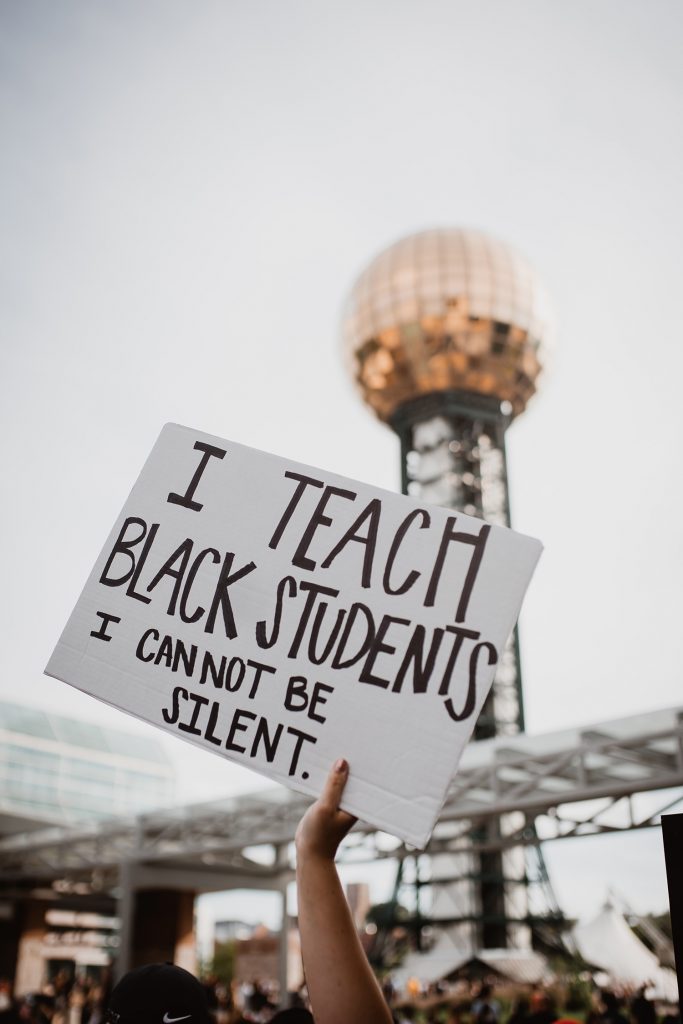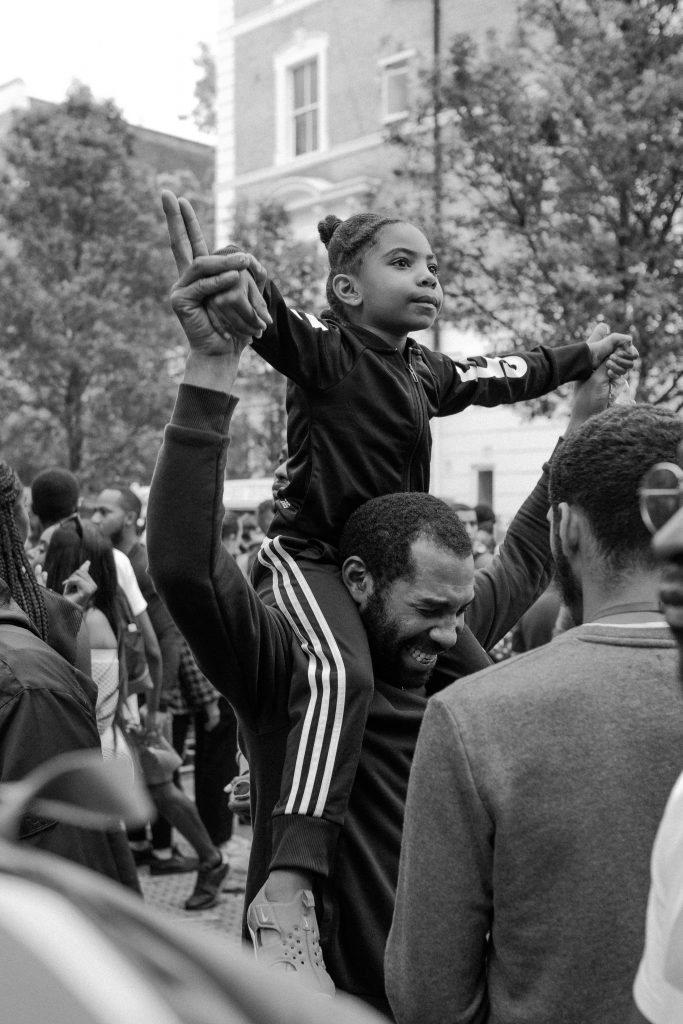

Dismantling Racism: Working from the Inside Out (July, 2020) In the first of our Pass the Mic series, Ayanna Cooper provides resources that support anti-racism, equity, and access in the U.S. The article also contains a list of just a few resources and organizations that can help to elevate our own understanding of how to dismantle racism while at the same time moving the work forward.

The Weaponization of English (August, 2020) In the second installment, Kisha C. Bryan and JPB Gerald examine coded language, position statements, and the Black Lives Matter movement in the spirit of acknowledgement and reconciliation

And Justice for ELs (September, 2020) And Justice for ELs is an essential resource for school leaders. Ayanna Cooper, editor of Language Magazine’s Pass the Mic series and a former U.S. Department of State English language specialist, has “been there, done that” and is now sharing how best to translate today’s federal mandates into actionable steps for ensuring the civil rights of our nation’s multilingual learners.

Questions to Ask Ourselves (October, 2020) Jolisa Beavers examines the role of language in constructing a homeplace in challenging times. The author argues that that today, a homeplace is also a space of companionship. A place where compassion thrives, equity and anti-racism discussions are being had, and structures and policies are being reimagined. Individuals in this space trust each other enough to share openly and honestly, even without professionalism, without the fear of being shamed, ridiculed, or oppressed in any way.

Leading and Learning (December 2020) Kia Myrick McDaniel examines the practitioners, systems, and structures in educational equity. The author states that as we continue the pursuit of equity across the country, no more salient example of the shift to inclusion and representation has occurred than the nomination and election of Kamala Harris.

A Voice for English Teachers in Africa (January 2021) Okon Effiong describes efforts to boost professional development both by and for English language teachers from Africa

Black History in the Community (February 2021) Settenah A. Wright explains why teachers of English learners need to teach local Black history and how to do it. Wright insists that there is no doubt that K–12 English learners (ELs) who are being educated in the U.S. should receive instruction about Black American history related to their communities.

All Englishes Matter (March 2021) Mary Romney explains the need for inclusive listening materials. The exclusive or predominant use of inner-circle Englishes in English language teaching (ELT) materials creates and perpetuates myths about the ownership and legitimacy of English. It maintains the hegemonic structure that privileges inner-circle Englishes.

After Whiteness (April 2021) J. P. B. Gerald, Vijay A. Ramjattan, and Scott Stillar present the first part of a vision of a possible future for English language teaching. From the canon to hiring practices to the classroom, we would be speaking about an entirely different field of English language teaching (ELT) if Whiteness were no longer centered, and although we are years of hard work away from this possibility, any calls for radical change are well served by pointing toward a possible future, and as such it is valuable to entertain the idea.

“Who You Be?”: Welcoming in the Language of Critical Love (May 2021) Shekema S. Dunlap, Millicent Carmouche, and Natasha Thornton share the power of being in African American language. To establish and maintain classrooms that are culturally responsive to the linguistic resources of students, the journey begins and ends with the teacher—teachers who understand that loving and humanizing pedagogies are not just about instruction but a way of believing and living.

Shackles by Any Name… (June 2021) Bremen de Haan and Darlyne de Haan see Juneteenth as an opportunity to address the societal legacy of slavery in the U.S. and the consequent educational inequalities.

Young, Bilingual, and Black (July 2021) Ayanna Cooper shows how fostering bilingualism and biliteracy works at Boston’s Toussaint L’Ouverture Academy

After Whiteness, Part Two (August 2021) J. P. B Gerald, Vijay A. Ramjattan, and Scott Stillar stress the importance of decentering Whiteness in English language teacher training and recruitment

Make English Truly a World Language (September 2021) Venice Irving and Anna Hearrell explain how cultural awareness can bridge the English divide. Even in this age of heightened awareness of cultural, historical, and political ties to the English language, the English language teaching (ELT) industry struggles with the fact that not every native English speaker speaks the same way, has the same accent, or even shares the same background

Honoring Hispanic Heritage Month (October 2021) Ayanna Cooper spends time with Sonia Nieto. Sonia Nieto is a Puerto Rican American and Brooklyn native. She’s multilingual, fluent in English, French, and Spanish, her first language. She described learning English in school as something she had to do de golpe, meaning “fast and furiously” (Nieto, p. 41). Her classmates were a diverse mixture of first- and second-generation European immigrants, African Americans, and a growing population of Puerto Ricans.

Reclaiming Wôpanâak Language (November 2021) Ayanna Cooper celebrates Native American Heritage Month with a vision of linguistic decolonization. n the United States, Native American Heritage Month is celebrated in November. For this article, the preferred term, Indigenous People will be used. Students who know their roots, culture and language are empowered. For Indigenous students this is especially important. This is the mission of the Weetumuw Katnuhtôhtâkamuq in Mashpee, Massachusetts. A school founded in 2016 by members of the Wampanoag community on their tribal land. The school is headed by linguist Dr. Nitana Hicks Greendeer, whose first name means “my daughter” in Algonquin, a language of the Algonquian family.

English Hegemony as an Issue of Justice Richard C. Benton Jr. argues that multilingualism is the birthright of all Americans. In US schools, English enjoys overwhelming hegemony. Granted, “standardized” English enjoys power and prestige over other, racialized, native US varieties, such as AAVE and even local “Spanglishes,” but their combined power leaves precious little space for the languages of other cultures and families, whether from immigrant or indigenous lands.

But You’re Not What We’re Looking For (January 2022) Mary Romney-Schaab explores employment discrimination in English language teaching. Because English is the key to participation in academia, science, and technology, among other areas, it is one of the most sought-after commodities in the world. We can extrapolate the magnitude of the demand for English worldwide when we consider the size of the market in only one country.

After Whiteness III (February 2022)
J. P. B. Gerald, Vijay A. Ramjattan, and Scott Stillar share ideas on how the ELT industry could evolve if Whiteness were successfully decentered. There have been two previous installments in this series. In the first, we spoke about some pedagogical ideas teachers could employ to challenge Whiteness in their classrooms (Gerald, Ramjattan, and Stillar, 2021a). In the second, we discussed the way we reimagined training and labor in English language teaching (ELT) such that nativeness is no longer something to which the field would ascribe and the positive impact this ideological shift might have.

Seeing Themselves in the Story (March 2022)
Ayanna Cooper asks Chanda Austin about the importance of diverse representation in children’s literature

The Endangered Language Alliance (April 2022)
Laura Silver reports on initiatives to protect and develop New York City’s linguistic diversity

The Power of Cultural and Linguistic Connections (May 2022)
Daphne Germain shares a mother’s perspective on the benefits of bilingual, bicultural education

Queering English Language Classrooms (June 2022)
Ethan Trinh invites us to think and do differently. Working with queer English learners requires close attention to their emotions and feelings, prior to or in conjunction with the teaching of language and literacy. Queer pedagogy does more than “good” instructional strategies and practices in terms of fitting the representation of lesbian, gay, bisexual, transgender, and questioning (LGBTQ+), or queer, people in the curriculum—it asks the teachers to think about how to explore the process of reading and thinking by disrupting the binary ways of doing and thinking.

English Divide in Francophone West Africa (July 2022) Mawa Samb offers solutions to the challenges created by teaching across a language divide. Sub Saharan Africa ranks among the regions in the world where education exclusion is the highest. In fact, according to UNESCO Information Statistics: “Over one-fifth of children between the ages of about 6 and 11 are out of school, followed by one-third of youth between the ages of about 12 and 14.”. This situation is likely to get worse as the area’s youth population is growing, creating even more demand for schooling.

STEM Is Not Only a Course, It’s an Experience (August 2022) Darlyne de Haan argues that we must be explicitly intentional to open up the opportunity of STEM to English learners. Science, technology, engineering, and mathematics (STEM) is not a single course. First, let me explain what STEM stands for. STEM is an acronym for science, technology, engineering and math. You may also see STEAM, which is an acronym for science, technology, engineering, arts, and math. More STEM opportunities are needed for multilingual learners (MLLs) for several reasons—primarily because students need access to project-based learning with a focus on STEM, and the field needs linguistically diverse professionals.

United for Bilingual Education (September 2022) Juan Valdez, Diane Rodríguez, and Elisa Alvarez report on the movement to establish the Dominican Republic as a truly bilingual society

Revolutionizing Language Acquisition Programs through Leadership Coaching (October 2022)
Ayanna Cooper interviews Rachelle Nelson about her role coaching school leaders who serve multilingual learners
Program Models
over Potluck


